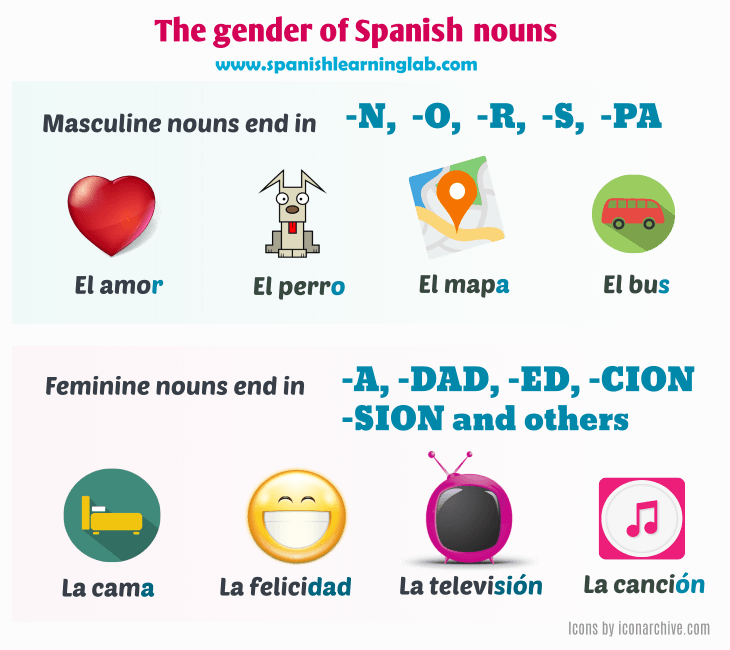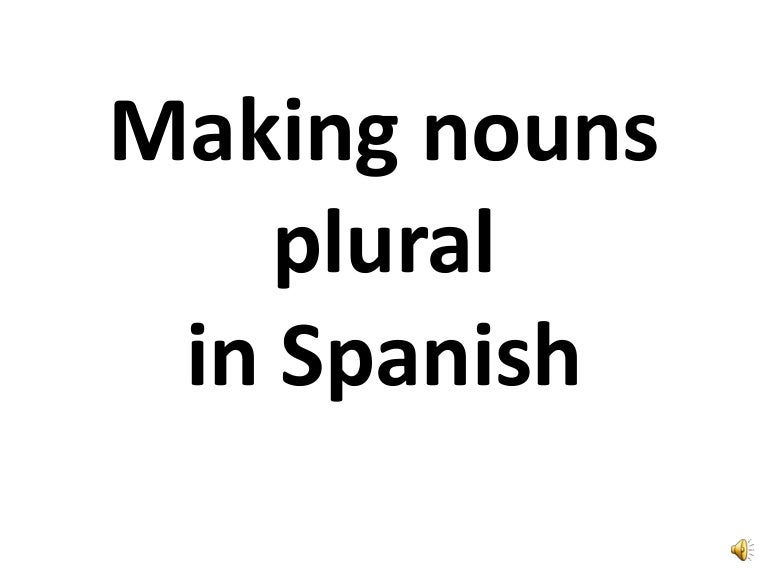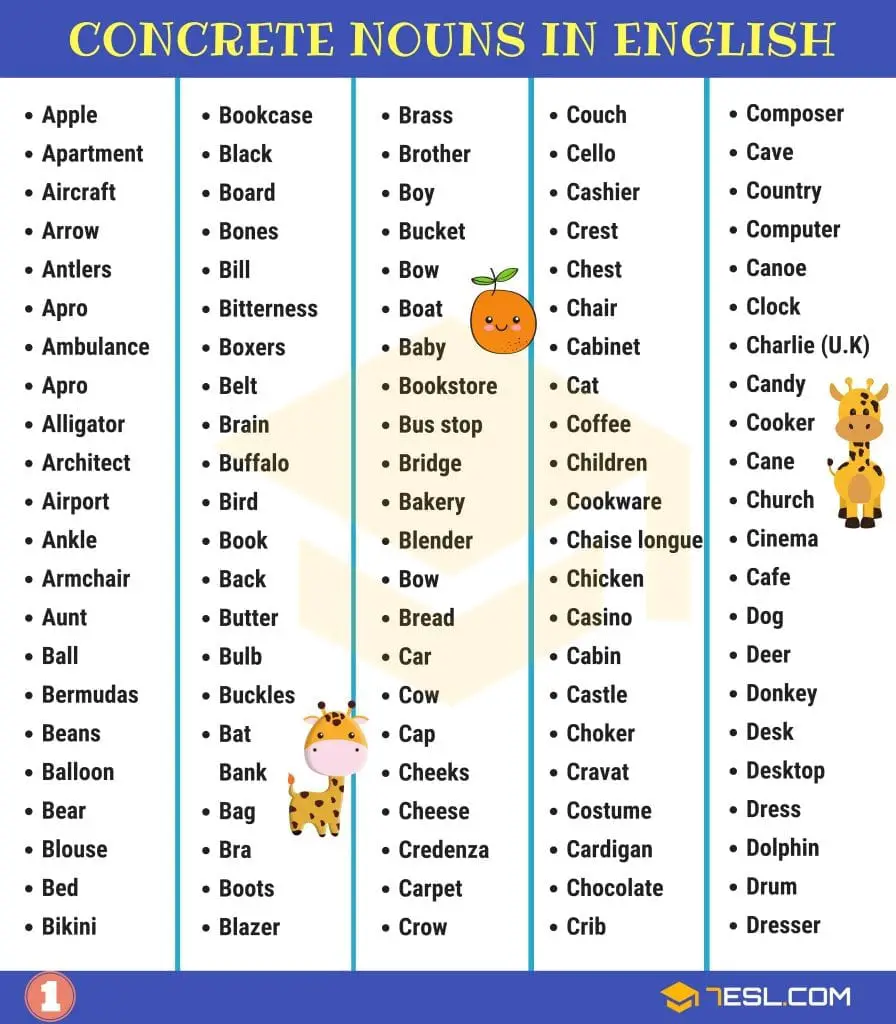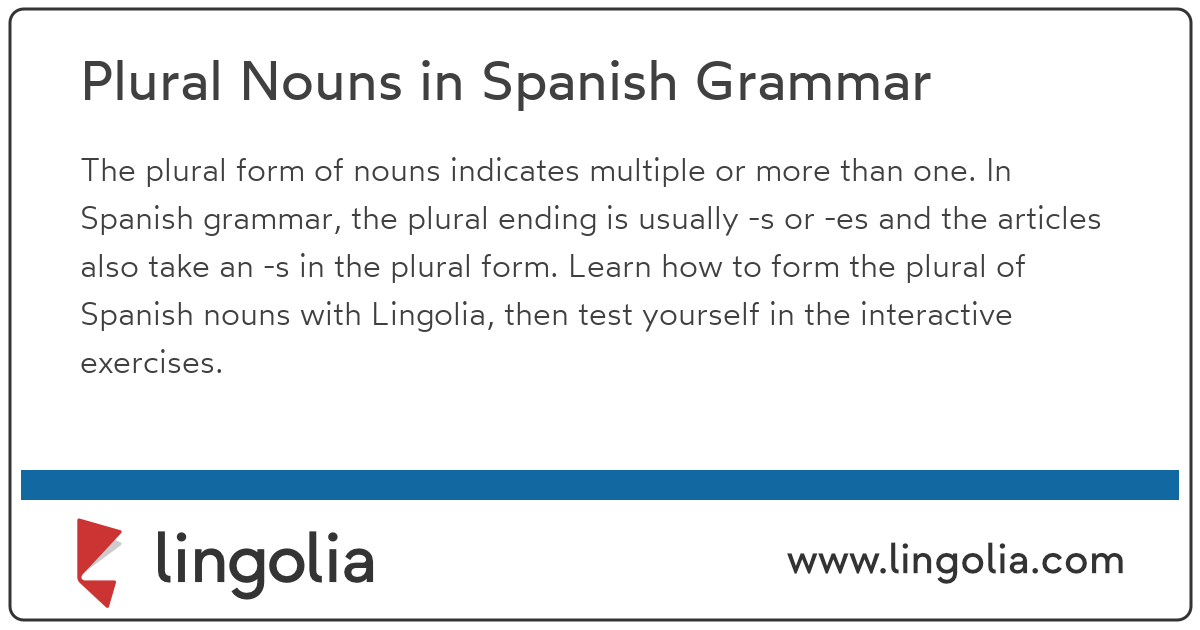There is a pattern with words with an initial stressed /a/ sound, such as agua ("water"), that makes them seem ambiguous in gender, but they are not. Such words take the masculine article, both definite and indefinite , in the singular form; they also take the singular modifiers algún and ningún when those modifiers precede the nouns. Similar words include el alma / un alma ("soul"), el ala / un ala ("wing"), el águila / un águila ("eagle"), and el hacha / un hacha ("axe").
Still they are feminine and, as such, they take feminine modifiers in both singular and plural forms, and they take feminine articles in the plural form as in las aguas frías. Unlike in English, all nouns have a grammatical gender in Spanish; they are either masculine or feminine. Note that se is also used for the formal "you" (usted/ustedes).
Like English nouns, most Spanish nouns have singular and plural forms. In addition, Spanish nouns referring to people and animals often have different masculine and feminine forms, which means that these nouns can have up to four forms – learn more. The unusual thing about words that end in–istais that they will be used for both males and females. The article will indicate the gender of the person the noun represents. Notice that it will seem strange to use a word ending in–ato refer to a male.
If you make a note of the nouns that break these general rules when you learn them, you'll avoid a lot of mistakes later. If you are trying to determine if a word is a common or proper noun, look at the capitalization. Is the noun capitalized in the middle of a sentence? Things are trickier if the noun is the first word in the sentence. In that case, ask yourself if the noun is referring to a specific person or thing. If it isn't, you are instead looking at a common noun.
A good rule of thumb is that all names and titles are proper nouns and will always be capitalized. The Spanish language has nouns that express concrete objects, groups and classes of objects, qualities, feelings and other abstractions. All nouns have a conventional grammatical gender. However, the division between uncountable and countable nouns is more ambiguous than in English. Los sustantivos propiosor Spanish proper nouns are the ones we use to name things or people such as Ana, Carlos, México, Brasil, Toyota and so on . What makes them easy to differentiate from common nouns is the fact tht proper nouns will always begin with capital letter as you can see in the sentences in the list.
You've still got your proper nouns (María), abstract nouns , countable nouns (el libro – los libros) and collective nouns (panal, archipiélago). This is what you are going to master in the next few minutes of reading. Check out our pages on gender and plural forms to learn which nouns have a fixed gender, how feminine nouns are formed and the rules for forming plural nouns according to their endings.
A noun that refers to something with male genitalia is masculine, a noun that refers to something with female genitalia is feminine and most other nouns are neuter by default. Once you do this, you will be a happier Spanish student because of it. I'm completely confident you will be speaking with Spanish direct object pronouns in no time. I can tell you that it was really good experience.
I wish I had been able to stay there much longer. Being in Spain, in Granada makes you speak Spanish from the first moment you are there. I took intensive Spanish courses four hours a day. The first two hours were based on speaking, and the other two were based on grammar. The teachers were really helpful and friendly.
However, you can experience the best Spanish learning in the street, with friends in and out school. I shared a flat with two other friends from other countries and we communicated in Spanish most of the time. They were really nice people, friendly and helpful all the time. Our flat was in the city center and ten minutes to the school. We always encouraged each other to speak Spanish.
We met after school, organized short trips in and out town, went dancing after school. In Granada you can always find something to do. There are historical places like Alhambra and the Cathedral.
If you are interested in flamenco, you can enjoy Sacramonte. You can go out to tapas bars, where you buy a drink and get free starters. Actually, you can walk everywhere or take the bus. If you like travelling, you can easily go to other cities at weekends. You can take a coach to Cordoba, Seville etc. at the bus station or take a train.
The school organizes excursions to those places at weekends and on... The difference is that "videocámara" is compound noun which is formed by the words (video + cámara) and it is functioning as the direct object in the sentence. AMIGO on the other hand is the subject of the sentence.
Nouns in the subject and object role are identical in form; nouns that show the possessive, however, take a different form. Usually an apostrophe is added followed by the letter s (except for plurals, which take the plural "-s" ending first, and then add the apostrophe). See the section on Possessives for help with possessive forms. There is also a table outlining the cases of nouns and pronouns.
The main difference between the use of direct object pronouns in Spanish and in English is their placement. While in English they are placed after the verb, in Spanish this pronoun is placed in front of the verb. Spanish direct object pronouns like me, te, lo, and la are an essential part to a Spanish speakers vocabulary so it's important that you fully grasp this concept. In particular, masculine nouns terminating in -o change the final vowel into -a. On the other hand, when a masculine noun ends in consonant (non-vowels) it forms its corresponding feminine form by adding a final -a. My name is Jaklien Wotte, I am from The Netherlands.
I studied for two weeks at iNMSOL in Granada in septembre 2009, I followed an intensive Spanish course, level A2. I spoke a little bit of Spanish, but I wanted to learn proper Spanish, make sentences, something that I wasn´t able to do yet. I was also very positive about the flexibility of the school . I followed partly private lessons, what also was a possibility. Granada is of course, beside all of this, a extraordinary beautiful and living city. The school organised activities every night, like a tapas tour, a tour in the Albaícin or a tour to the mountains, Alpujarras, in the weekends.
Sometimes the school organised special classnights, were for example the streetlanguage of Andalusia and films were spoken. My Spanish language progressed a lot, exactly what I wanted. I had a splendid time and I would return to this school for another course. Because coming from English you don't have any reference to hold on to, sometimes our memory can only recall so much and we mix up the gender. Even though Spanish is a language of exceptions, there are a few guidelines that can help when wanting to determine if a noun is feminine or masculine. All of these rules use the ending of a word as a trick to determine its gender.
This is what makes learning masculine and feminine Spanish nouns easier than other romance languages such as French. If the verb requires a preposition (like "talked with" or "jumped on"), the direct object pronoun stays in place; however, it requires a different pronoun in this case. See the section below on prepositional object pronouns for more. A noun is essentially a label for places, things, events, ideas, concepts and so on.
Like English, nouns in Spanish may be categorized as common or proper, count or mass, singular or plural. Unlike English, Spanish nouns are also categorized as either masculine or feminine. A noun that ends in the letter–emay be either masculine or feminine. If a noun ending in –erefers to an object, it is usually a masculine word, but not always. It is safest to memorize the gender of these words by learning them with an article. With some transitive verbs, the indirect object or the direct object can be left out.
But if you think about it, it's usually still implied that it exists. For example, "The doctor performed heart surgery" is a complete sentence, but it's still understood that an indirect object, namely a living being with a heart, was affected by the action. Luckily, pronoun forms are very closely related, so it's usually easy to figure out what they mean when reading or listening to Spanish.
On the flip side, one letter or accent mark can completely change the meaning, meaning their relatedness can lead to some difficulty when speaking or writing Spanish. No more moose, meese, goose, geese nonsense! English is full of random, unexplainable exceptions to singular and plural nouns. Fortunately, Spanish is clear-cut when it comes to making the switch. Along with some basic guidelines for changing the noun itself, you need to know how the articles change. Countries are a type of nouns, whereas nationalities are adjectives.
"Brasil" is a proper noun , just like names. The words "país" and "playas" are common nouns. In English we have proper nouns , abstract nouns , countable nouns (book – books), collective nouns , etc. To say "they" in Spanish, you say eitherellosorellas.
The same gender rules you learned innosotrosapply. A group consisting entirely of females should be referred to asellas. Any group with at least one male in it should be referred to asellos. If you're ever in doubt, it's best to use the masculine form. A pronoun is a shorter word that takes the place of a longer noun. We use pronouns once we've introduced a noun so that we don't have to keep repeating the same thing over and over again.
Here are some sentences where the subjects have been replaced with subject pronouns. This is because in English, living creatures often have different names, depending upon whether they are male or female. You have direct object pronouns in English too. Contrary to what you may think, direct object pronouns in Spanish are here to make your life easier. I found iNMSOL through the website of Cervantes and lots of times I've been in Granada via iNMSOL. For the next times lots of my friends went to Granada and they liked very much both of them iNMSOL and Granada.
Especially in summer season the school is mostly very crowded and the age range differs from... But everytime I found a friend at my age and I had lots of friends and we still see each other for years.. For the first 2 visits I 've stayed with a spanish family and I liked them. The family was very warm, the cooks are fantastic and the house was very clear.
For the other visits I've stayed in a flat with students and they were great too. We were getting on well, at nights we went out together, we had traveled together and seeing each other too. The school is doing a leveling exam to define your language level and they put you a convenient class based on that exam. If the students' age is very small, they put them within a separate class with their own teachers. Every day of the week they arrange another activity. City trips, tapas route, cinema day, musical activity, history of spain etc.
The teachers are fantastic and they are very good at communicating. And the activities are made by the teachers. I've joined every one when I was able to and don't miss them. In the weekend Saturday and Sunday they have trips to another cities.
Sevilla, Cordoba, Costa Tropical, Alpujarras, Cadiz, even Morocco. These are with fee.But cheaper than the other tours.The guides graduated from Historical sciences and they... The first thing I have to say is that the staff at iNMSOL is some of the friendliest people I have ever met.
They will help you with whatever difficulties or problems you may have. Moreover, if you choose to join some of the trips they arrange, they have knowledge of mostly whatever you need to know. The staff have been wonderful in giving tips for how to enjoy this fantastic city even more.
When it comes to the learning I don't have much to say other than I can assure you that you will learn spanish. The more important thing is what you get for 'free'. If you choose to live with a family during the stay you get to see how the locals does it. Also, if you are staying here for a long time, it is nice to have an acommodation while searching for your own place to stay. If you want much value for your money and have a really nice time, I think iNMSOL is a really good alternative, and I don't think you'll regret it if you choose to go there. Most of the recurring verbs do not establish useful selectional preferences, and most of the noun phrases are actually semantically weak pronouns.
When you are talking about a group of males and females, always use the masculine plural form of the noun, definite article and adjective. Instead, what you should focus on is a number of rules you can use to simplify the process of recalling the gender of Spanish nouns. This, in turn, will help you develop and understand the role your intuition plays over time with language learning and, in particular noun gender. Both common and proper nouns are used in most of our sentences. For the most part, it is pretty easy to use them, but you should be careful to always capitalize proper nouns and to only capitalize a common noun when it is appropriate to do so.

























No comments:
Post a Comment
Note: Only a member of this blog may post a comment.